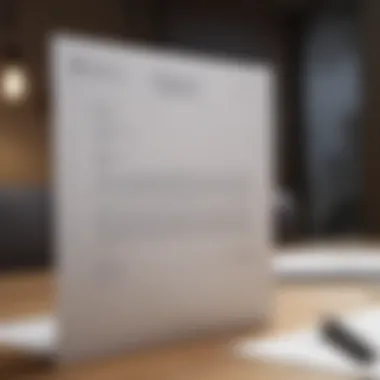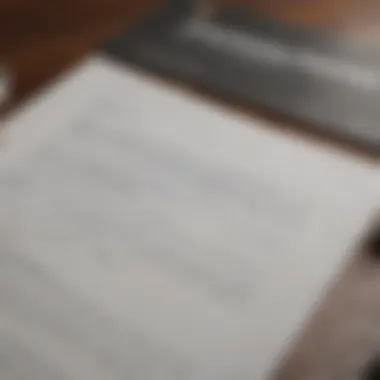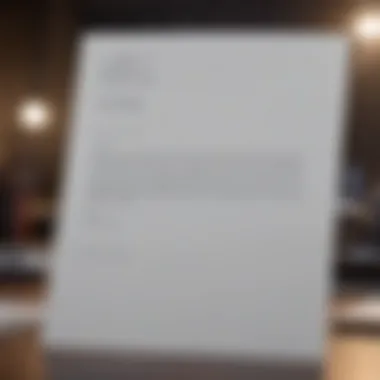Why a Well-Crafted Cover Letter is Crucial for Job Applications


Setting Clear Objectives in a Cover Letter
In the realm of job applications, the cover letter assumes a pivotal role in conveying one's qualifications and motivation. It acts as a bridge, connecting the candidate's skill set with the employer's requirements. Much like setting financial goals, outlining clear objectives in a cover letter is essential for success. By articulating specific goals and aligning them with the job description, candidates can demonstrate a focused approach and a deep understanding of the position's demands. Just as in personal finance, where setting achievable targets is crucial for monetary growth, defining clear objectives in a cover letter enhances the applicant's chances of landing the desired job.
Art of Crafting a Persuasive Narrative
Crafting a cover letter is akin to developing a compelling story that captivates the reader's attention from the outset. In the same vein, as storytellers weave narratives with intricate detail, job seekers must infuse their cover letters with engaging content that highlights their strengths and professional journey. Just as a well-structured plot keeps readers engrossed, a carefully crafted cover letter grips the hiring manager's interest, prompting them to delve deeper into the candidate's profile. Emulating the art of storytelling, crafting a persuasive narrative in a cover letter involves weaving together experiences, skills, and aspirations to create a cohesive and impactful presentation.
Tailoring Content to Showcase Relevance
One of the key principles in both financial planning and cover letter crafting is customization. Personalized financial strategies consider individual circumstances, risk tolerance, and goals to maximize returns. Similarly, tailoring the content of a cover letter to the job requirements showcases the candidate's relevance and suitability for the role. Just as financial advisors adjust investment portfolios to align with clients' objectives, job applicants must align their competencies with the employer's needs to demonstrate value. By presenting tailored content that highlights accomplishments and skills pertinent to the job opening, candidates can set themselves apart in a competitive job market.
Enhancing Visibility Through Strategic Positioning
In the digital age, visibility is a crucial aspect of both financial management and job hunting. Utilizing targeted keywords in online content improves search engine rankings and enhances brand visibility. Similarly, integrating relevant keywords in a cover letter increases the likelihood of applicant tracking systems identifying the candidate as a suitable match for the job. Strategic positioning of skills, experiences, and achievements in a cover letter mirrors the digital marketing tactics used to enhance an organization's online presence. By strategically placing key information in the cover letter, candidates can enhance their visibility and ensure a higher chance of being shortlisted for the desired position.
Introduction
Embarking on the journey of job applications, one encounters a pivotal component that often determines success - the cover letter. In the bustling landscape of job hunting, one must navigate the intricacies of crafting a cover letter that not only complements the resume but also encapsulates one's qualifications, motivations, and aspirations. Understanding the nuances of the cover letter is paramount in presenting oneself effectively to potential employers, highlighting key skills and experiences that set one apart from the competition.
Definition of a Cover Letter
A cover letter serves as a personalized introduction to a prospective employer, offering insights into the candidate beyond what a resume can convey. It is a tailored document that showcases an individual's qualifications, achievements, and aspirations in a succinct yet impactful manner. By encapsulating one's professional journey and goals, a cover letter provides a glimpse into the personality and suitability of the applicant for the position.
Purpose of the Article


This article aims to dissect the multifaceted role of a cover letter in the realm of job applications. From elucidating the essence of a cover letter to delving into its significance in demonstrating motivation, this piece serves as a comprehensive guide for individuals seeking to enhance their application prowess. By exploring the intricacies of cover letter crafting, readers will garner invaluable insights that can propel their job search endeavors to new heights.
Understanding the Role of a Cover Letter
In delving deep into the realms of a cover letter's significance within the job application process, it becomes evidently clear that this document plays a pivotal role in distinguishing applicants from the sea of candidates. It serves as a tailored narrative complementing the data-driven structure of a resume by adding a personalized touch that resonates with hiring managers. By understanding the nuances of a cover letter, individuals can strategically position themselves as ideal candidates for a given role, shaping the initial impression that potential employers form.
Complementing the Resume
A cover letter acts as a dynamic companion to the static nature of a resume, expounding upon key achievements and experiences in a more narrative format. Whereas a resume provides a concise overview of one's professional history, a cover letter allows for a deeper exploration of relevant skills and accomplishments. This pairing ensures that recruiters gain a holistic view of an applicant's qualifications, offering a more comprehensive understanding of their fit for the role.
Showcasing Qualifications
One of the primary functions of a cover letter is to showcase qualifications in a way that resonates with the hiring organization's needs. By articulating how past experiences and skills align with the requirements of the job, applicants can effectively demonstrate their suitability for the role. This section serves as a strategic opportunity to highlight specific achievements, certifications, or skills that directly contribute to the desired outcomes of the position, setting the stage for a compelling application.
Expressing Motivation
Beyond merely listing qualifications, a cover letter provides a platform for candidates to express their genuine motivation and passion for the role. This segment offers insight into what drives an individual professionally, showcasing their enthusiasm for the opportunity and their alignment with the company's values and mission. By articulating motivation in a sincere and compelling manner, applicants can establish a personal connection with recruiters, setting themselves apart as not just qualified candidates but as individuals invested in the company's success.
Key Elements of an Effective Cover Letter
In the realm of job applications, a cover letter serves as a vital tool to differentiate oneself from the multitude of applicants. Crafting a compelling cover letter involves meticulous attention to key elements that make it stand out. These elements play a crucial role in showcasing an applicant's qualifications, motivation, and fit for the desired position. By focusing on specificity, relevance, and clarity, the cover letter becomes a powerful asset in the job search process.
Personalization
Addressing the Hiring Manager


When it comes to addressing the hiring manager in a cover letter, the impact can be significant. Tailoring the salutation to the specific individual overseeing the hiring process adds a personal touch that resonates well. It shows that the applicant has taken the time to research and personalize their application, demonstrating a higher level of interest and commitment to the role. Addressing the hiring manager directly elevates the professionalism of the cover letter and can create a favorable impression right from the start.
Tailoring to the Job Description
Tailoring the cover letter to align with the job description is paramount in demonstrating one's suitability for the position. By customizing the content to highlight relevant skills and experiences that match the requirements outlined in the job posting, the applicant can make a strong case for their candidacy. This tailored approach not only showcases attention to detail but also reflects the effort put into understanding the needs of the employer. A well-tailored cover letter increases the chances of capturing the recruiter's interest and stands out amidst generic applications.
Professional Tone
Avoiding Jargon
Maintaining a professional tone in a cover letter involves avoiding industry-specific jargon that may not be universally understood. Clear and concise language enhances the readability of the cover letter and ensures that the message is conveyed effectively. By steering clear of technical terminology, the applicant can appeal to a broader audience and facilitate better comprehension of their qualifications and experiences.
Conciseness
Conciseness in writing is a virtue, especially when it comes to cover letters. Being able to convey key points and accomplishments succinctly demonstrates the applicant's ability to communicate clearly and efficiently. A concise cover letter holds the reader's attention and conveys professionalism by respecting their time. By focusing on essential information and avoiding unnecessary details, the applicant creates a more impactful and memorable impression.
Accomplishment Highlights
Showcasing Relevant Achievements
Highlighting relevant achievements in a cover letter is crucial for substantiating the claims made in the resume. By showcasing specific accomplishments that directly relate to the job requirements, the applicant provides concrete evidence of their capabilities. This not only reinforces the qualifications mentioned but also strengthens the overall candidacy by providing tangible examples of past success.
Quantifying Results
Quantifying results in a cover letter adds a layer of specificity that enhances credibility. Using metrics and numbers to demonstrate the impact of past actions provides context and relevance to the achievements mentioned. Quantifying results allows the hiring manager to gauge the applicant's potential contributions and aligns expectations more effectively. By quantifying accomplishments, the cover letter becomes more persuasive and substantiates the applicant's claims with measurable outcomes.


Tips for Crafting an Impressive Cover Letter
Crafting an awe-inspiring cover letter is a pivotal aspect of any job application process. It serves as the first impression you make on a prospective employer, offering a glimpse into your personality, professionalism, and suitability for the role. Understanding the vital role of a cover letter in distinguishing your application from the competition is crucial. By focusing on tips for crafting an impressive cover letter, individuals can elevate their chances of capturing the attention of hiring managers and securing coveted job opportunities.
Now, delving into the specifics, let's explore the essence of meticulously researching the company you are applying to.
Research the Company
Thoroughly researching the company before drafting your cover letter is an indispensable step in the application process. By gaining insight into the company's values, culture, mission, and recent developments, you can tailor your letter to align with their objectives. Demonstrating a keen awareness of the organization's background showcases your genuine interest and commitment. Additionally, incorporating specific details about the company in your cover letter indicates a personalized touch that resonates with employers, setting you apart as a proactive and informed candidate.
Moving on to the next crucial point, it is imperative to emphasize the importance of customizing each cover letter according to the specific job application.
Customize Each Letter
Tailoring your cover letter to each job application is fundamental in showcasing your suitability for the role. Avoid the temptation of using generic templates, as personalized cover letters have a significantly higher impact. Highlighting relevant skills, experiences, and achievements that match the job requirements demonstrates a tailored approach. By addressing the hiring manager by name and referencing the job title and company name, you convey a level of attentiveness and dedication that resonates positively with potential employers.
Lastly, paying close attention to detail by proofreading your cover letter meticulously is a critical step in ensuring its effectiveness.
Proofread Carefully
After crafting your cover letter, dedicating time to proofread it carefully is paramount. Eliminating any grammatical errors, typos, or inconsistencies enhances the professionalism and coherence of your document. Additionally, conducting a thorough review allows you to refine your content, ensuring clarity and conciseness. Employers value candidates who exhibit strong attention to detail, making a polished and error-free cover letter a testament to your competence and commitment to excellence.
Conclusion
In the grand tapestry of a job application, the cover letter adorns a critical position, serving as the veritable gateway between applicant and recruiter. Its significance transcends mere formality, delving into the realms of personal branding and professional articulation. The crux lies in its ability to encapsulate the essence of one's qualifications and motivation in a concise yet impactful manner. As the final flourish in a job seeker's presentation, the cover letter holds the power to sway decision-makers and carve a lasting impression.
Crafting a compelling cover letter necessitates a nuanced understanding of the job requirements, the company's ethos, and the art of self-promotion. It's not just a document; it's a strategic tool honed to align one's skills with the employer's needs seamlessly. A well-crafted cover letter can elevate an application from the mundane to the exceptional, opening doors to coveted opportunities and setting the stage for a successful career trajectory.
Final Thoughts on Cover Letters
In the realm of cover letters, the parting words carry immense weight, capping off the narrative woven throughout the document. Final thoughts serve as a reflective moment, where the applicant can reinforce key points, express gratitude for the opportunity, and leave a lingering impression on the recipient. They offer a final chance to convey enthusiasm for the role, showcase readiness to contribute, and exude professionalism in communication.
When penning down final thoughts on cover letters, striking a balance between confidence and humility is paramount. It's an opportunity to reiterate interest in the position, highlight alignment with the company's values, and convey eagerness to further discuss how one can add value to the organization. Politeness, grace, and a forward-looking approach can leave a positive imprint on the hiring manager, setting the tone for a potential interview and fostering a favorable view of the applicant's candidacy.



